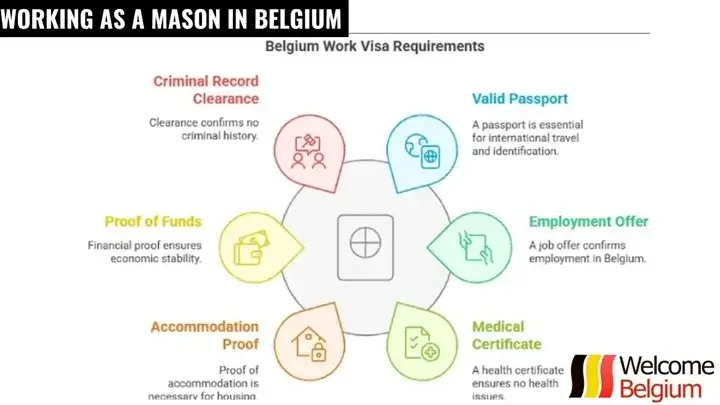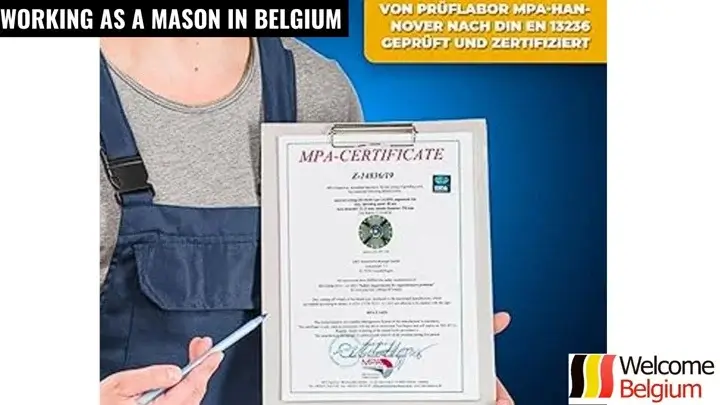Working as a mason in Belgium is one of the most realistic and accessible job options for immigrants, especially if you’re looking to quickly find work in Europe and start earning. The construction industry here is steadily growing, and there’s always a shortage of skilled workers. That’s why masons are in constant demand—locals and newcomers alike.
If you’ve got construction experience or are ready to learn on the job, your chances of landing a gig are solid. Many Belgian employers are open to foreign workers, especially if you’re handy and not afraid of hard physical work. Knowing the language is a plus, but even with just basic skills, you can get started, especially through agencies that help with paperwork and settling in.
Requirements for Masons in Belgium
To get hired as a mason in Belgium, it’s not just about wanting it—you need the right skills and to meet specific requirements. The construction industry here is well-organized, and employers value professionalism. The key is having experience and knowing modern construction techniques, especially in bricklaying, clinker work, and restoring old buildings.
Are you a student looking for a job in Belgium? Learn all the ways in this article.
Vacancies often ask for at least 2–3 years of experience. This shows you can read blueprints, follow construction standards, and handle tasks on-site without needing constant supervision. Experience in restoration work is a big bonus, since Belgium has tons of historic buildings where precision and attention to detail are key.
Knowing one of the languages—French, Dutch, or at least basic English—is a plus. It’s not always mandatory, but it’ll make adapting, communicating with the team, and understanding safety rules way easier.
Requirements for Masons in Belgium for Immigrants:
- Work Experience
- Minimum 2–3 years in construction
- Skills in bricklaying, clinker, cinder blocks, or aerated concrete
- Experience in restoration work (preferred)
- Ability to read construction blueprints and work to project specs
- Professional Skills
- Knowledge of technologies: insulation, reinforcement, formwork, mortar prep
- Proficiency in masonry techniques: standard, decorative, cladding
- Familiarity with EU safety and construction standards
- Teamwork and ability to follow foreman’s instructions
- Confident use of construction tools and equipment
- Language Skills
- Basic knowledge of French, Dutch, or English
- Needed for instructions, team communication, and safety compliance
- Documents
- International passport
- Work permit or visa (for non-EU citizens)
- Resume with experience and skills
- Medical certificate and criminal record check (sometimes)
- Trade certificates or diplomas (preferred)
- Driver’s License
- Category B license
- Important for remote sites or independent commuting
- Physical Fitness
- Good physical condition
- Readiness for heavy work, including outdoors in any weather
- Ability to work 8–10 hours daily
- Personal Qualities
- Responsibility and punctuality
- No harmful habits
- Ability to work in an international team and follow discipline
Formal education isn’t always required, especially if you’ve got solid practical experience. But having a vocational background (like a construction college or trade school) gives you an edge. Some employers or agencies might ask for diploma verification, especially for long-term contracts or official employment.
To recognize a foreign diploma, you may need to translate it into one of Belgium’s official languages (French, Dutch, or German) and get it certified by a body like NARIC (National Academic Recognition Information Center). For trade jobs, though, informal skill checks—like interviews, trial days, or reference letters—are often enough.
Tip:
A trial day on a Belgian construction site is a killer way to show off your skills without a diploma and score a job offer right away.
Qualification Verification
Confirming your qualifications and taking advanced courses is a smart move if you want to work as a mason in Belgium. Even with experience from another country, validating your diploma and taking local courses helps you get up to speed with standards and safety rules. It’ll make finding better jobs faster and level up your professionalism. Here’s how to do it.
Qualification Verification for Masons in Belgium
Official qualification verification isn’t always required, especially if you’re hired through agencies or employers who test your skills on-site. But having a verified diploma or certificates boosts your shot at stable, better-paying jobs.
If your mason diploma is from outside the EU, you can get it recognized through NARIC in the region you’re targeting—Flanders, Wallonia, or Brussels. You’ll need to submit an application, translated documents, and sometimes pass tests or interviews.
Steps to Recognize a Mason’s Diploma in Belgium:
- Determine your region:
- Flanders: NARIC-Vlaanderen
- Wallonia and Brussels: ARES
- Prepare documents:
- Copy of diploma and grades transcript
- Translation into Dutch (Flanders) or French (Wallonia/Brussels) by a sworn translator
- Copy of passport or ID
- Completed consent form for document checks
- Optional: criminal record check, work record, reference letters
- Submit the application:
- Flanders: via NARIC-Vlaanderen website
- By mail: Agentschap voor Hoger Onderwijs, Volwassenenonderwijs, Kwalificaties en Studietoelagen, Koning Albert II-laan 15 bus 129, 1210 Brussel, België
- Contact: 1700 (from Belgium) or +32 2 553 17 00 (from abroad)
- Pay the fee:
- Education level recognition: €119
- Specific qualification recognition: €238
- Paid via bank transfer after application registration
- Wait for review:
- General recognition: ~4 months
- Specific professional recognition: ~9 months
- May require additional requests or interviews
- Receive the decision:
- Sent by mail or available online
- If approved, your diploma is valid for work or further education
Note:
The process in Wallonia and Brussels is similar but handled through the ARES website, where you’ll find forms, addresses, and instructions.
Find out how to find a job in agriculture in Belgium here.
Verifying your mason qualification in Belgium is a solid way to prove your skills and land better-paid gigs. Even with foreign experience, this step helps you fit into local standards. It’s worth the effort!
Advanced Training Courses
Immigrants can access both paid and free training courses. Centers like VDAB (Flanders), FOREM (Wallonia), and ACTIRIS (Brussels) offer programs for construction trades, covering masonry, safety, blueprint reading, and specialized skills. These are often government-funded and free for unemployed people or immigrants with work permits.
You can also take short courses for certificates like:
- VCA (Veiligheid, gezondheid en milieu Checklist Aannemers): A safety cert required on most Belgian and Dutch construction sites.
- EU Certificates: Confirm your skills meet European standards.
Often, training happens on-site, especially if you start through an agency or with a mentor. Employers are happy to train motivated workers “in the field” if you show responsibility and eagerness to learn.
Working Conditions
Mason work in Belgium is governed by labor laws, industry agreements, and strict safety standards. Key points include hours, contract types, duties, and safety requirements on-site.
Figure 3
Working Conditions for Masons in Belgium
Description of Full Working Conditions for Masons in Belgium
Working Hours and Schedule:
- Weekly hours: 38–40
- Workdays: Monday–Friday
- Typical day: 7:00–8:00 AM to 4:00 PM
- Breaks: Mandatory lunch and technical breaks
- Overtime: Paid at a higher rate, must be agreed upon
- Weekends: Off, unless agreed otherwise
- Regulated by Working Time Legislation and industry agreements (CP 124 – Commission Paritaire de la Construction).
Main Duties include laying bricks, concrete blocks, and other materials, preparing mortars, using levels, laser marking, and blueprints. You’ll also handle demolitions, partition installations, foundation pouring, and finishing work within your role. Strict compliance with construction standards, safety rules, and foreman instructions is a must. Work can involve new builds or renovations.
Find out about working in the hospitality industry in Belgium here.
Contract Types:
- Permanent (CDI): Long-term with full benefits
- Fixed-Term (CDD): For a specific period or project
- Agency: Via intermediaries, often with a chance to go permanent
- Seasonal: Common in spring and summer
- Probation: 1–3 months, depending on the company
- Regulated by the Belgian Labor Contract Code (Code du Travail).
Work happens indoors or outdoors, depending on the project. Companies usually provide tools, workwear, and PPE. Sites have temporary facilities, restrooms, and break areas. You might travel between sites in a region, working in cities or rural areas.
Occupational Health and Safety is tightly regulated:
- Mandatory safety briefings
- PPE: helmets, gloves, safety boots, vests
- On-site safety coordinator
- Labor Welfare Control inspections (Contrôle du Bien-être au Travail)
Rules follow the Law on Worker Well-Being and EU regulations like Directive 89/391/EEC, setting safety standards across the EU. Construction-specific rules, like Directive 92/57/EEC, cover temporary or mobile sites and are mandatory for all companies in Belgium, including foreign contractors.
Important:
Belgium’s construction safety aligns with EU-OSHA standards and EU directives, ensuring consistent safety across the EU.
Mason Salaries in Belgium
Mason salaries in Belgium are stable and competitive compared to other EU countries. Pay depends on region, qualifications, contract type, and employer. For foreigners without language skills, wages start at the minimum but grow with experience and adaptation.
Average hourly rate: €15–22 gross. Beginners without experience earn around €2,500/month before taxes, while experienced masons make €3,000–3,800 or more. Overtime and tough conditions can boost income with bonuses.
Find out how immigrants can find jobs in Bruges here.
Wages are usually hourly, paid monthly. Extras may include:
- Transport and meal compensation
- Bonuses for quality and deadlines
- Allowances for heights, bad weather, or weekend work
Factors affecting salary:
- Relevant experience and references
- Construction terminology in Dutch, French, or German
- Willingness to work on remote or large projects
- Certificates like VCA
| Region | Qualification | Hourly Rate (€ gross) |
| Flanders (Ghent, Antwerp) | Beginner | 15–17 |
| Experienced Specialist | 18–22 | |
| Brussels | Beginner | 16–18 |
| Experienced Specialist | 20–23 | |
| Wallonia (Liège, Namur) | Beginner | 14–16 |
| Experienced Specialist | 17–20 | |
| Industrial Sites and International Contractors | Specialist with VCA and language skills | Up to 24 |
In 2025, platforms like VDAB.be, Le Forem, and Randstad.be listed mason jobs with:
- €16.89/hour: Beginners
- €18–21/hour: 3+ years experience
- €22+/hour: Large projects or subcontractors
These are gross rates, with 25–30% deducted for taxes and social contributions. Use calculators like jobat.be to estimate net income based on region, marital status, and tax class.
How to Find a Job as a Mason in Belgium
Start with the right job platforms. Official sites like VDAB.be (Flanders), Le Forem (Wallonia), and Actiris (Brussels) are top choices. International platforms like Indeed and LinkedIn also post construction jobs regularly.
Besides searching yourself, many use specialized construction agencies for job placement and paperwork help. Networking with builders or companies can also speed things up.
| Organization/Company | Address | Website | Service Description |
| VDAB (Flanders) | Regions of Flanders | vdab.be | Flanders employment service, vacancies, training, job support |
| Le Forem (Wallonia) | Regions of Wallonia | leforem.be | Wallonia employment center, job search, training courses |
| Actiris (Brussels) | Brussels, Rue Royale 90 | actiris.brussels | Brussels employment service, vacancies, job consultations |
| Randstad Belgium | Offices across Belgium | randstad.be | Private agency, construction job placements |
| Indeed Belgium | Online platform | be.indeed.com | International job site, searchable by region/profession |
| Online platform | linkedin.com | Professional network for jobs and networking | |
| Tempo-Team | Various offices in Belgium | tempo-team.be | Agency for temporary/permanent jobs, including construction |
| Start People | Various offices in Belgium | startpeople.be | Agency for temporary/permanent hiring, trade jobs |
| Constructiv | Belgian construction association | constructiv.be | Construction organization, training, and vacancies |
| Manpower Belgium | Offices in major cities | manpower.be | Large agency for construction jobs |
Your resume should detail experience, skills, materials knowledge, and safety protocols. Mention language skills, certificates (e.g., VCA), and flexibility for travel or hours. Keep it concise and structured to stand out.
Documents for legal employment:
- Valid passport or ID
- Work permit or residence permit (if needed)
- Qualification/experience certificates
- Medical certificate for physical labor
- Sometimes, proof of safety training
After a job offer, register with the Belgian employment service and sign a labor contract for social benefits, health insurance, and worker rights.
Housing and Transport for Workers
When you head to Belgium to work as a mason, housing and getting to the site are big deals. Nobody wants to crash in a dump or blow half their pay on buses. Good news: most construction employers hook you up with solutions so you can focus on the job.
Companies often provide housing—rented apartments, shared houses, or dorms. It’s basic but decent: bed, shared kitchen, shower, Wi-Fi. Costs run €200–400/month, often deducted from your salary. If they don’t provide housing, they might help find rentals, costing €500–700/room in smaller cities.
What’s in employer-provided housing?
- Furniture and appliances (fridge, stove, washer)
- Utilities (water, electricity, sometimes internet)
- Cleaning of shared areas (in dorms)
Transport to sites is usually sorted. For far-off projects, companies provide vans that pick you up in the morning and drop you off after. If you’re close, walk or bike—cycling’s big in Belgium. Rarely, you might get a bus or train pass, depending on the employer.
Daily lives easy. Hit up Aldi or Lidl for cheap groceries and cook in the shared kitchen. On weekends, workers chill in pubs or visit nearby cities—Belgium’s small, so everything’s close.
Interesting Fact:
Migrant workers in Belgium often stay in “construction camps”—temporary modular homes with solid conditions near big projects.
Work Visa and Legalization
You can’t work legally as a mason in Belgium without a work visa, so this is a must. Don’t stress, though—if you know the steps, it’s smooth. Just avoid scammers promising to “fix everything” for a few grand.
For Ukrainians and CIS citizens, it starts with a labor contract. The employer applies for a work permit, proving no locals were available. Then you apply for a Type D visa (long-term), which takes 1–3 months. Ukrainians have a simplified process since 2022 due to temporary protection.
Visa documents:
- Passport (valid 6+ months)
- Labor contract from a Belgian company
- Criminal record check
- Health insurance
- Visa photos and application form
Ukrainians with Temporary Protection don’t need a visa—just register with the local commune for an ID card. For CIS countries (e.g., Uzbekistan, Kazakhstan), it’s trickier, sometimes requiring qualification verification.
To dodge scams, stick to legit agencies or direct employers. Check forums for reviews, avoid upfront payments, and read contracts carefully. Legal work always goes through official channels.
Interesting Fact:
In 2024, Belgium issued over 20,000 work visas for skilled and unskilled workers from Eastern Europe.
Conclusion
Working as a mason in Belgium is your shot at earning €2,000–3,000/month and building a stable life in Europe. It’s perfect if you’re cool with physical work, eager to learn, and want a construction career. Got bricklaying skills or just strong hands and grit? Belgium’s got you.
Pros:
- High pay compared to Ukraine or CIS
- Housing and transport often covered
- Legalization and career growth opportunities
Cons:
- Tough physical work, especially in rain
- Language barrier (English or basic Dutch helps)
- Visa paperwork can drag
My advice, bro: Vet the employer, learn a few Dutch or French phrases, and don’t sweat the new stuff. Belgium’s more than waffles and beer—it’s a real chance to build your future. Pack up and go—your construction career’s waiting!





You guys are outstanding, I have never seen an article this educative. Am still Surprise that I have all the information I need all in one article